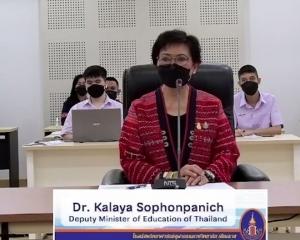With many New Zealand teachers expected to reach retirement age over the next decade, the Ministry of Education is keeping a close watch on numbers.
Sixty-four Otago teachers were among the 1353 nationwide who left their jobs in 2015.
Ministry of Education early learning and student achievement deputy secretary Lisa Rodgers said the number of Otago teachers leaving the profession each year fluctuated between 37 and 92 during the past decade; and nationwide, the numbers bounced between 1247 and 1702.
At present, there are more than 2350 teachers in Otago, and more than 52,200 teachers in New Zealand.
She said the percentage of teachers leaving the profession was relatively consistent, with no indication during the past nine years there had been an increase. However, the ministry was monitoring the situation closely, she said.
‘‘As well as monitoring figures, we regularly meet with groups from the education sector right across New Zealand to discuss what they are seeing on the ground.
‘‘If trends start to appear that are concerning, then we act to investigate what is happening as well as put initiatives in place to address the situation.''
In 2010, University of Otago College of Education secondary programmes co-director John Taylor warned the end of New Zealand's economic recession might set off a chain reaction of retirements among senior secondary school staff, causing a nationwide shortage of teachers.
He said there was anecdotal evidence teachers in the 55-60 age group were holding on to their jobs instead of retiring.
‘‘They had been planning to retire, but because of the recession their financial situation is not as rosy as they had hoped.
‘‘A lot of these teachers have retirement investments which may have taken a hit during the recession, so they've been encouraged to hold on a bit longer.''
A 2015 PPTA survey found secondary schools across New Zealand were finding it increasingly difficult to recruit teachers - particularly in subjects such as the sciences, mathematics, technology and Te Reo Maori.
University of Otago College of Education senior lecturer Dr Chris Linsell believed the shortage was not only due to teachers retiring, but also the increasing number being lured away by higher-paid non-teaching jobs and the lack of teaching graduates coming through to replace them.
Dr Linsell said there was a real danger the shortage could result in pupils not getting the education they needed. Last year, Ministry of Education student achievement head Dr Graham Stoop said the ministry was supporting schools that were having difficulty recruiting staff.
The ministry was also responding to the demand for secondary teachers on several fronts.
That included drawing together a sector group to address workforce issues as part of a complete workforce plan; subsidising the cost of recruiting for schools with difficulties finding staff; providing allowances for schools which were hard to staff; and reimbursing relocation costs for teachers.











